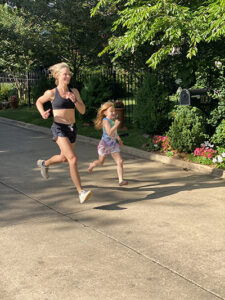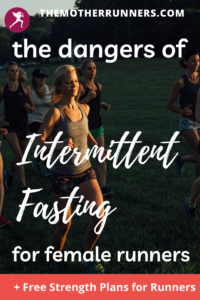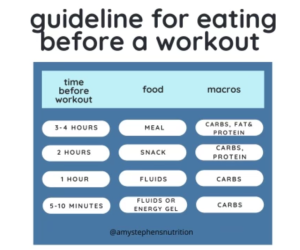This summer, I made a mistake. I combined intermittent fast and exercise for almost my entire base phase of marathon training. The result? I got injured and will not be racing my marathon this fall.
Let me back up and explain why I decided to intermittent fast and exercise, and make the case for why you SHOULD NOT.
In April, at the peak of a solid training block, I very randomly got lung inflammation also known as pleurisy (I wrote about what happened on Instagram here). I was off running for 6 weeks and had to start back with marathon training in earnest.
During my 6 weeks off, I happened to encounter many family and friends, interview athletes, and read articles in outlets like Eating Well and Runner’s World, purporting the benefits of intermittent fasting. For athletes I wrote about for Marathon Handbook like ultramarathon greats Dean Karnazes and Zach Bitter, running fasted stoked their fat-burning capabilities, allowing their bodies to run on glycogen for longer.
Our glycogen stores only last about 2 hours. Most marathoners take much longer to run a marathon, so by allowing your body to become efficient in burning another fuel source, you may be able to run for longer, avoiding bonking or hitting the wall.
Related: Train Your Gut to Avoid Bonking
How intermittent fasting led to my running injury

So, I ran my entire base training phase on an empty stomach, including several 15-16 mile runs. I thought, if I was running easy and refueled immediately, I would be okay. I also thought my body would tell me it was too stressed, but I felt fine on the runs.
Related: Can PRP Injections Heal Plantar Fascia Tear?
Then, my heel started hurting. I rehabbed at home, but it continued to worsen until it became full-blown plantar fasciitis and Achilles tendonitis, necessitating another 6 weeks or more break. Talking with my coach, we tried to figure out how this happened. We were doing EVERYTHING right.
Related: Should You Do Glycogen Depletion Runs?
Then I shared I was running on an empty stomach, and he was borderline aghast: This was probably the smoking gun. During this time, I had started doing more research on the research and realized the purported benefits were observed in overweight, underactive men NOT active females.
“There are over a hundred thousand studies on intermittent fasting, and none support the use of intermittent fasting by runners or endurance athletes. In fact, there are studies that show intermittent fasting impairs performance in athletes,” explains registered dietician for runners, Jen Scott. Indeed, in MOST cases intermittent fasting in women who exercise regularly pose risks (there are ALWAYS exceptions to the norm, however).
Studies show there are several reasons female athletes should NOT intermittent fast:
- It disrupts hormone production, potentially causing health issues such as menstruation cessation, weakened bones, and impaired recovery.
- It depresses the thyroid and increases cortisol, causing an increase in belly fat.
- It causes a decrease in fat burning, hurting long-term performance.
- It causes energy deficiency, hurting short-term performance.
- It causes muscle breakdown.
In this article I will cover:
- What is intermittent fasting
- Why people intermittent fast
- 3 science-backed reasons why female athletes should not intermittent fast and exercise
Related: RED/S: The Health Danger Facing Female Runners
What is intermittent fasting?

Intermittent fasting is an eating pattern in which people fast for a specific time each day to promote eating less while burning more fat. There are three primary types of intermittent fasting, according to nutritionist Lisa Richards, author of The Candida Diet:
- The 5:2 method allows the runner to take in only 500 – 600 calories each day for two non-consecutive days, and then eat a regular diet the other five days.
- The 16/8 method requires the dieter to skip breakfast, restrict their calorie intake to 8 consecutive hours only, and fasting for 16 hours.
- The Eat-stop-eat method is fasting in the more traditional sense where the dieter goes without food for 24 hours.
Benefits of Intermittent Fasting
People intermittent fast because it is easy to do—no restricting foods. You’re just changing when you eat plus studies have shown to have many health benefits such as weight loss, improved endurance, improved insulin resistance, increased muscle, and initiated cellular repair, among others.
Why Female Athletes Shouldn’t Do Intermittent Fasting
Studies show if you’re an athlete (aka exercise for more than 2.5 hours a week – which I bet you do), the purported benefits of intermittent fasting DO NOT APPLY to you. Most of the studies done showing the benefits of intermittent fasting are done on overweight men, not athletic women. And these studies show that you do not get additional benefits from doing both: an intermittent fast and exercise.
Here are 3 compelling science-backed reasons why runners should not intermittent fast:
Intermittent Fasting Can Disrupt Hormone Production & Cause Weight Gain
In fact, for women, intermittent fasting and exercising can be harmful to your health and your performance, says Dr. Stacy Sims, author of the groundbreaking book ROAR and the movement Women Are Not Small Men.
Dr. Sims explains that intermittent fasting and ketogenic diets both disrupt a neuropeptide called kisspeptin, which is responsible for sex hormones and endocrine and reproductive function, which also plays a role in maintaining healthy glucose levels, appetite regulation, and body composition. Kisspeptin is more sensitive to disruption in women than men, and when it gets perturbed, our sex hormones aren’t produced and released the way they should.
Dr. Sims explains what happens on her blog:
“When our brain perceives we have a deficiency in nutrients, especially carbohydrate, we have a marked reduction in kisspeptin stimulation, which not only increases our appetite but also reduces our sensitivity to insulin. This is why research shows intermittent fasting is more likely to cause impaired glucose intolerance in women, but not men.”
Furthermore, she says, adding stress (exercise) on top of stress (lack of fuel), stress hormones like cortisol rise.
“As you keep increasing that stress, it keeps your sympathetic drive high and reduces your ability to relax. Your thyroid activity is depressed, which messes with your menstrual cycle. Your body also starts storing more belly fat.”

The result: weight gain, poor performance, a whacked-out menstrual cycle, and more anxiety and stress.
Related: Does Running Cause Imbalanced Hormones?
Intermittent Fasting Can Decrease Fat Burning in Runners
One reason why runners do intermittent fasting (myself included) is the belief that it will improve fat burning to prevent bonking in the marathon. The belief is that by running easy with depleted glycogen stores, the body will have no choice but to burn fat, becoming more efficient in fat oxidation. If the body learns to burn fat more than carbohydrates, that can prolong how long a runner can run before running out of glycogen stores.
Unfortunately, this assumption is not grounded in science. In fact, a study in the European Journal of Sport Science studying cyclists who ate no breakfast, aka intermittent fasted, found that performance declined.
Specifically, cyclists who didn’t eat breakfast performed ~3% worse. Also, the no-breakfast group showed a decrease in fat burning. This is obviously the exact opposite results runners like myself wanted!
Endurance coach Jason Koop of Train Right summarizes the findings:
“So, now we have a situation where skipping breakfast specifically to promote fat oxidation does the exact opposite in a real-world scenario, and causes a decline in performance. You literally get the worst of both worlds. You perform worse and fail to glean any of the purported fat-burning benefits from the fast.”
The result: poor performance and decreased energy efficiency.
Intermittent Fasting Can Cause Muscle Breakdown

Finally, a literature review (a round-up of a bunch of studies) of intermittent fasting and exercise results in the Strength and Conditioning Journal found that training on an empty stomach doesn’t have any benefits. In fact, training or running on an empty stomach can cause proteolysis, muscle-wasting caused by a breakdown of proteins in the muscles.
The authors wrote:
“The literature does not support the efficacy of training early in the morning on an empty stomach as a tactic to reduce body fat. At best, the net effect on fat loss associated with such an approach will be no better than training after meal consumption, and quite possibly, it would produce inferior results. Moreover, given that training with depleted glycogen levels has been shown to increase proteolysis, the strategy has potential detrimental effects for those concerned with muscle strength and hypertrophy.”
As Amy Stephens, dietician for elite runners, puts it—the body is smart and wants to survive:
“Our body needs a minimum amount of carbs to ‘turn off’ the liver from finding other sources of glucose. If there isn’t sufficient glucose available (starved state), then your liver will find it from your muscles,” she explains, adding this process is even more pronounced when an athlete is training at higher vo2max.
The muscle breakdown can lead to injury, warns Scott.
“If an athlete is running during the fasting period first thing the morning, the body will respond to prolonged exercise (> 45 minutes) by elevating cortisol levels which alters glucose metabolism and causes the body to catabolize muscle tissue to access protein and fat substrate.”

This muscle breakdown leads to:
- an increase in injury risk,
- a decrease in recovery,
- and a negative impact on body composition.
Fasting afterward will cause further damage by not replenishing glycogen stores and giving the body the protein necessary to stimulate muscle synthesis and repair muscle damage. Even five days of low-calorie intake can interfere with new bone formation and soft tissue remodeling, adds Stephens.
Result: Intermittent fasting can break down your muscles, making you weaker and more likely to get injured.
Is it ever okay to intermittent fast and run?
So, is it ever okay to run on an empty stomach? There are two situations where it may be okay to exercise or run on an empty stomach:
- If you are an overweight man, there could be benefits for you to try intermittent fasting.
- And, if you have an easy run that lasts under an hour, it’s okay to (occasionally) run without breakfast (but it is better to grab a light snack before). The goal is to eat enough to fuel your body but not be stored as fat.
Related: Marathon Fueling Guide 101
But in most cases, the risks of running or exercising on an empty stomach far outweigh any potential benefits.
“A well-fueled athlete is more apt to perform better than one who is fasting,” says Scott. “An athlete optimizing their nutritional intake and timing before, during, and after their workouts and races, as well as balanced dietary intake throughout the day, is ultimately going to perform the best and have the best chance at maintaining lean body mass.”
Bottom line: Intermittent fasting can hurt YOU and your running performance. Don’t do it.
If you want guidance in reaching your running goals, including nutrition guidance, check out our coaching services!

This is an amazing article. Such important information. Thanks for always being so honest! I’d love to repost. Keep on keeping on!
Thank you so much, Abby! It can be so easy to take the IF bait since studies do show benefits. It is important to read the fine print of the research though!!
Amazing read. I wish I had read this earlier. I have injured my knee and I hope it’s not permanent damage. Keeping fingers crossed.
I am sorry! I hope you recover soon!
Just found your blog as I get back into running longer distances after 3 babies and one broken ankle. I have loved IF as a lifestyle but read this and worry about injury per the science you quote. What about for those of us long distance runners who reeeeeeaaaallly don’t like running with food in the belly? Is coffee with 1-2 tablespoons of whole milk sufficient for a 6-7 mile morning run?
Hi! Can you tolerate a couple of graham crackers? Even if the run is under an hour, with-in day windows of energy deficiency have negative ramifications on the endocrine system. And then glycogen gets used overnight, having something light before can help her have quality training sessions. Even if you CAN get away not eating before, you aren’t optimizing exercise capacity within training sessions